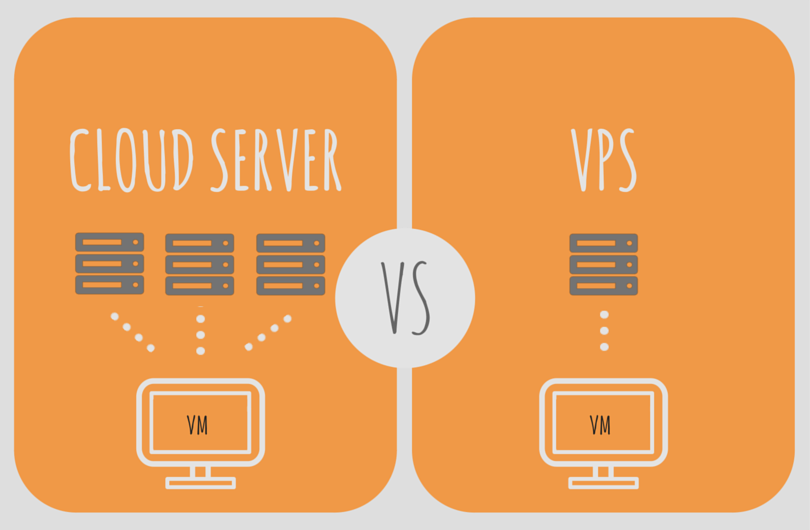
Today misunderstanding about the technological difference between Cloud Hosting vs VPS Hosting in the web hosting industry is becoming quite a doubt now.
Most of the people generally tend to misread the basic difference between the two. This is due to the lack of awareness about the differentiating factors of these two web hosting technologies.
They no more need to own a physical architecture (a CPU with the certain specifications of processor, RAM, and storage), an operating system, on top of this hardware, and then the particular web application (like WordPress, Magento, Drupal, Joomla, and many more etc.) on which website is to be hosted.
And, that’s not it! Further, this arrangement will require efficient and redundant power supplies and periodic maintenance to ensure the server is up and running at all times.
Let’s jump to the basics for a while about what cloud and virtualization are. In simple words, cloud and virtualization is something that separates the hardware, operating system, and the application running on that hardware from each other.
The basic concept remains the same in both of the technologies. However, reliability, flexibility, and availability have been some major separating indicators between the two.
VPS Hosting?
The architecture is one which has multiple individual dedicated slots on the identical virtual machine. Each slot may be assigned to dedicated resources. Nonetheless, the technology generally works on a time-shared or resource-shared phenomenon.
However, the remainder of the applications on different slots are up and running with none disruption in commission.
But, there remains a clear stage, although in exceptional cases, where a serious trouble hitting a specific slot, like unexpectedly excessive traffic on a random day or DDoS (Distributed Denial of Service) attack, can cause the complete machine and therefore the subsequent applications to travel down as all the resources belong to the identical machine.
However, VPS hosting does have some useful points because it brings the margin closer between the dedicated and shared hosting solutions.
Cloud Hosting?
Cloud hosting is that the top-of-the-line website (or application) hosting solution available presently. The technology has already achieved an incredible level of acceptance in an exceedingly short period of your time.
Websites hosted on the cloud are accessible anytime, anywhere. this implies that hosting resources for every website are replicated on every cloud server within the cluster. for instance, if one cloud server has maximum traffic already, then it automatically routes the query for the precise site to the idle cloud server within the cluster.
In other words, cloud runs the net hosting services, like files storage, SSH, FTP, SFTP, and email services (for e.g. SMTP), etc., on many alternative servers simultaneously.
This simultaneous allocation of equal resources on the cloud servers within the cluster provides a good deal of reliability. as an example, if one amongst the machines malfunctions, it’ll not cause failure or disruption within the entire hosting service.
Benefits of VPS Hosting
- VPS hosting offers total and complete freedom. absolve to manage your server as you prefer, you’ve got access to everything and you’ll install all the software you would like.
- Hosting in VPS is incredibly efficient. Unlike shared hosting, the VPS isn’t keen about traffic or audience. you’ve got your own resources and you’re isolated from other servers.
- Hosting in VPS is secure. all of your files are private and inaccessible to other clients irrespective of their rights on the server.
Benefits of Cloud hosting
- Cloud hosting is comparatively reliable because your website is hosted on a virtual partition that takes advantage of multiple physical networks. When one among the servers goes offline, it’ll slightly reduce the resource level to the cloud but won’t add up to your website. No inaccessibility or the rest.
- Cloud hosting is secured by many physical servers that are shielded from third-parties who want to access their premises or interrupt their services.
- Cloud hosting is extensible, flexible, and scalable. It doesn’t have the identical constraints as one server. Resources are available in keeping with your requests and in real time.
- Cloud hosting is economical because you merely get what you employ.
Which one is Better?
VPS hosting is mostly less efficient since it allocates a specified amount of computing resources to every client. Hence, if the need increases, the system wouldn’t be able to handle the extra inflow. it’ll simply crash. Same would be the case if the server malfunctions.
Cloud hosting, on the opposite hand, tackles the rise differently. Under the cloud environment, the web site is hosted on a pool of unified computing resources. This simply means if one server is reaching its optimum level, then a second server is prepared to function. Similarly, if a server fails, the web site will still be running as other servers will still serve the incoming traffic.
If you would like reliability and powerful functionality, then Cloud hosting could be a great choice. The recent price slashes in Casbay Cloud hosting and therefore the likes shows that the market has immense growth potential. Furthermore, it shows that cloud hosting is getting affordable too.
VPS is created for folks that have an interest in hosting just an internet site. While it’s powerful, VPS doesn’t guarantee uptime should your website fails thanks to high traffic or a technical glitch.



